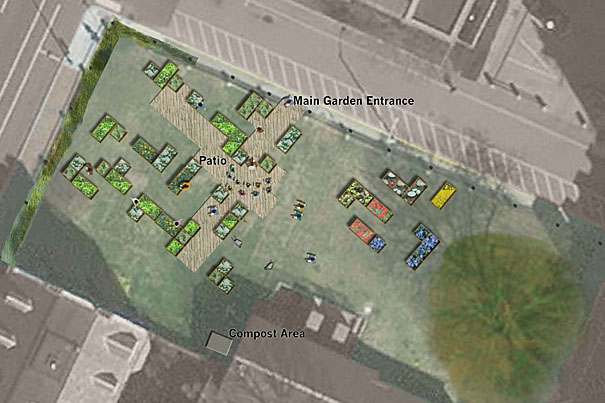
This drawing highlights where the first of Harvard’s raised-bed gardens will be located. The 560-square-foot growing space at 27 Holyoke Place in Cambridge, will provide experiential education in sustainable, urban agriculture and food for students, faculty, and the community.
Drawing prepared by Ilana Cohen, Erin Kelly, Rebecca Bartlett, Amy Whitesides, Dorothy Tang, Abhishek Sharma, Xue Zhou, and Athens Qin
Coming soon: Harvard garden
Students will oversee University-planned effort to grow food locally
Harvard University will literally sow new seeds for learning with the launch next month of its first raised-bed garden, located at 27 Holyoke Place in Cambridge.
The 560-square-foot growing space, to be created and maintained by Harvard College students and other members of the Harvard community, will provide experiential education in sustainable, urban agriculture and food for students, faculty, and the community.
The garden initiative will kick off today (March 22) with a naming contest. Members of the Harvard community and the public are encouraged to submit suggested names for the space by midnight Thursday (March 25). (Visit www.green.harvard.edu for details.) A panel from the garden planning committee will select the winning entry.
The space is designed to be an interdisciplinary educational and social experience.
“Sustainable, edible gardens have become important areas of learning and collaboration at colleges and universities throughout the country,” said Kathleen Frith, assistant director of the Center for Health and the Global Environment at Harvard Medical School and acting director of this project. “Several members of our community have been advocating for a garden, and I’m thrilled to see it becoming a reality, already bringing together staff, students, and faculty from across the University.”
The garden will be supervised by the Center for Health and the Global Environment, in collaboration with a new student association called the Harvard College Garden Project, along with the Office for Sustainability, the Food Literacy Project (a division of Harvard University Hospitality and Dining Services), the University Planning Office, Landscape Services, and the Faculty of Arts and Sciences.
“We are excited to be the first generation of Harvard students to grow food on campus,” said Louisa Denison ’11, one of the student leaders of the Garden Project. “This project will allow us to be a part of a growing sustainable food movement in a tangible and concrete way.”
Programming will begin on April 17, when volunteers will fill in 25 new raised beds. With Harvard undergraduates as primary caretakers, the garden will be sustainably and organically managed, drawing from strategies developed and implemented elsewhere on campus, including using composting rather than conventional fertilizers, crop rotation, and minimal water use.
Food raised from the garden will be featured in dishes during on-site tastings, in demonstrations, on undergraduate dining hall menus, and in campus food venues. Food will also be sold at the Food Literacy Project’s Farmer’s Market at Harvard, and donated to The Greater Boston Food Bank, with which Harvard has a dedicated relationship.
“How we grow our food is critical to our own health, the health of our communities, and the health of the environment,” said Eric Chivian, director of the Center for Health and the Global Environment and assistant professor of psychiatry at Harvard Medical School, who is also affiliated with Beth Israel Deaconess Medical Center. “The garden provides faculty and students with a hands-on teaching and research opportunity that will help them better understand our dependence on nature.”
Students from the Harvard Graduate School of Design’s Landscape Architecture and Technology Department developed the garden’s design, working with a planning committee of staff, students, and faculty. Initial plans are modest, with an eye toward growth as the space becomes a more vital part of the Harvard experience. At the outset, the garden will employ two student summer interns to manage daily upkeep and to develop programming, including inviting faculty to use the garden in their coursework, hosting community events, and having regular volunteer days.
“Creating a student community garden seems at first glance to be a simple undertaking,” said Mike Lichten, FAS associate dean for physical resources and planning. “In fact, it is quite complex in an urban university setting, involving a number of people and organizations across the University. It has been exciting and gratifying to see the student, academic, and administrative groups bring their expertise and enthusiasm together to create a garden that will be educational and enjoyable for everyone. I’m pleased that the Faculty of Arts and Sciences can help support the physical creation of this garden, so that our students can benefit.”
“This garden visibly demonstrates Harvard’s commitment to sustainability, and it is a prominent symbol of our campus’ efforts,” said Heather Henriksen, director of the Office for Sustainability. “It also showcases how students working with staff and faculty can come together to create campus learning opportunities that benefit our community and identify larger solutions.”
For more information about the garden, the naming contest, or volunteer opportunities, visit the Web site.



